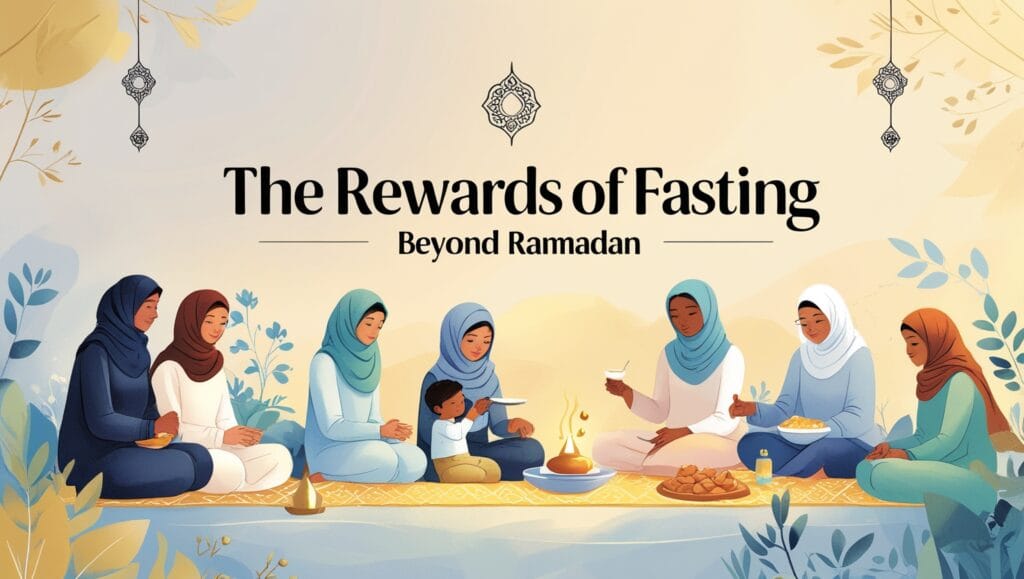The benefits of fasting beyond Ramadan go far beyond physical health. While Ramadan is the most well-known time for fasting in Islam, voluntary fasting throughout the year carries deep spiritual, mental, and emotional rewards. These fasts, like those on Mondays and Thursdays or the white days (13th, 14th, and 15th of every lunar month), help us stay connected to Allah and purify our souls.
Fasting is not just about abstaining from food and drink—it’s about self-discipline, gratitude, and drawing closer to our Creator. Let’s explore the powerful spiritual benefits of fasting beyond Ramadan and how it can transform your heart and daily life.
Why Fast Outside of Ramadan?
Fasting Is a Sign of Sincerity
When you fast voluntarily, outside of any obligation, it shows a sincere desire to please Allah. You’re not doing it because everyone else is or because it’s required—you’re doing it purely for Him. This intention holds a high spiritual value and increases your connection with God.
Secondary keywords: voluntary fasting in Islam, fasting for Allah, Islamic fasting benefits
The Spiritual Benefits of Fasting Beyond Ramadan
1. Builds Stronger Taqwa (God-consciousness)
Taqwa means being aware of Allah in everything you do. The more you fast, the more you become aware of your behavior, speech, and actions. You avoid gossip, lying, anger, and sinful thoughts. This awareness carries into your daily life even when you are not fasting.
“O you who have believed, fasting is prescribed for you… that you may develop taqwa.” — [Quran 2:183]
Fasting beyond Ramadan keeps your heart soft and your mind alert. It teaches you self-control and mindfulness in a world full of distractions.
2. Increases Gratitude and Patience
When you go without food or water even for a few hours, you begin to appreciate what you have. Voluntary fasting reminds us of the blessings we take for granted every day. It also builds patience, as you learn to delay your desires and wait for the time to break your fast.
Gratitude and patience are both beloved qualities in Islam, and fasting helps strengthen them in a natural way.
Secondary keywords: gratitude in Islam, patience through fasting, benefits of voluntary fasting
3. Brings You Closer to Allah
The benefits of fasting beyond Ramadan include a stronger spiritual connection with Allah. When you fast with the intention of pleasing Him, you are engaging in a highly rewarded act of worship. The Prophet Muhammad (peace be upon him) said:
“Every act of the son of Adam is for him, except fasting; it is for Me, and I will reward it.”
— Sahih Bukhari
This Hadith shows how special fasting is in the sight of Allah. It’s a private act of worship that strengthens your bond with your Creator.
4. Purifies the Heart and Soul
Just as fasting cleanses the body of toxins, it also purifies the soul of spiritual diseases like arrogance, greed, and envy. When you fast regularly, you have more time to reflect on your actions and work on your character.
Fasting helps in creating a clean heart, which is essential for true success in this life and the Hereafter.
Secondary keywords: soul purification in Islam, Islamic character building, fasting and spiritual growth
5. Keeps You Connected to Ramadan Spirit
One of the challenges after Ramadan is maintaining that spiritual high. Fasting outside of Ramadan helps you stay connected to the habits you developed during the holy month. You remain engaged in worship, dua, and good deeds.
This continuity brings long-term spiritual growth and avoids the feeling of spiritual burnout.
Recommended Days to Fast Beyond Ramadan
There are several sunnah (recommended) days to fast throughout the year:
- Mondays and Thursdays
- 13th, 14th, and 15th of each Islamic month (White Days)
- Six days of Shawwal (after Eid al-Fitr)
- Day of Arafah (9th of Dhul-Hijjah)
- Day of Ashura (10th of Muharram)
Fasting on these days multiplies your rewards and brings blessings in both your spiritual and worldly life.
Tips to Start Fasting After Ramadan
If you’re new to fasting outside of Ramadan, here are a few easy tips:
- Start with once a week, like Mondays.
- Eat a healthy suhoor (pre-dawn meal) for energy.
- Make sincere intention before fasting.
- Use your fast as a time for dua, dhikr, and reflection.
- Encourage friends or family to fast with you.
Remember, the goal is to grow spiritually and get closer to Allah.
Conclusion
The benefits of fasting beyond Ramadan are countless—from building patience and gratitude to purifying the heart and strengthening your relationship with Allah. Voluntary fasting is a beautiful way to stay spiritually grounded throughout the year.
When you fast for the sake of Allah, outside of any obligation, you’re making a personal commitment to better your soul. Whether it’s once a week or a few days a month, every fast brings you one step closer to becoming your best self.
So take the first step today. Embrace the benefits of fasting beyond Ramadan and witness the transformation in your faith, mind, and heart.

